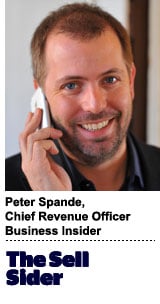 “The Sell Sider” is a column written by the sell side of the digital media community.
“The Sell Sider” is a column written by the sell side of the digital media community.
Today’s column is written by Peter Spande, chief revenue officer at Business Insider.
While we love stories of disruption in business, actual disruption of your personal life and work is a lot less fun.
At this moment, any advertising salesperson planning to work more than a few years in this profession must be thinking about the impact of digital evolution on their job. Some say the profession will disappear. Others say the profession will be unrecognizable in its current state in a just a few short years.
These changes often take a very long time – much longer than the fans of disruption would like. But even with this longer timetable, anyone in the advertising profession, and especially those hiring and leading sales organizations, need to be “future-proof.”
From having the privilege of working with and knowing many great digital ad salespeople, I’ve developed a checklist of things I look for in a future-proof salesperson.
Curiosity
The best salespeople have always been extremely intelligent. The future-proof salesperson not only possesses this intelligence but also gets ahead of the market as often as possible. I want to hire the person who asks why we are using one vendor instead of another.
One top seller I know took up blogging. When asked why, she said simply, “I wanted to understand what it takes to do what the edit side does every day.”
Analytical
The future-proof sales person must be able to process and, more importantly, communicate analytically. This is the only way to develop and relate a rationale for a solution with any kind of scale needed in the marketplace we are developing.
Notice that I don’t suggest a mathematician or quant. That isn’t the primary role of a salesperson, and I don’t think it will be any time soon. However, media used to be a refuge for people who are allergic to math, and that is no longer the case.
A Good Or Great Writer
We all want face-to-face meetings and think of selling in some major way as presenting, but so much of our business gets done over email. Poorly written communication is a huge red flag and a drag on people’s ability to get deals done.
Ensemble Player Vs. Soloist
Advertising sales has a long history of lone wolves imposing their will on media organizations. This was possible, in large part, because so much of what was sold was standardized. A page is a page is a page, and a 30-second spot is a very self-contained unit.
Even when we sell elements that are standardized, programs often succeed or fail based on the ability to connect various elements to one another in a customized fashion. This requires a team, and the all-too-common philosophy of “fake it ‘til you make it” just doesn’t work any longer.
A Consummate Integrator
The future-proof seller takes disparate ideas, products, team members and data points and pulls them together to create simple, easy-to-understand solutions.
A great integrator builds a whole that is much greater than the sum of its parts. The value that he or she adds comes, in part, from the ability to do this work for his or her clients. Content strategy, distribution, data targeting and measurement combine to create a cohesive strategy for each client.
Sure, this has been a component of advertising for decades, but the level of complexity and the diversity of the solutions available require a level of skill and expertise that wasn’t a part of past generations of salespeople.
Adaptability
This is the most important skill. The future-proof salesperson must roll with the punches and incorporate new information and ideas rapidly. The best and brightest do this with an enthusiasm that propels them forward, while others stop to lick their wounds.
I look for people who have diverse backgrounds, both personal and professional, with evidence of big risks and shifts. While we all want to hire and be winners, with big exits and fast-growing teams, I look for evidence of a stumble with a rapid recovery, which should be second nature to salespeople, since many sellers spend a huge percentage of their careers responding to people rejecting their offerings. Some people estimate that the typical salesperson hears “no” about 70% to 80% of the time.
Sadly, I see many, or perhaps most, sellers unable or unwilling to put the same kind of work into evolving their careers that they do when a deal takes a turn for the worse. Rather than adapt to the changing market, many salespeople double-down on the skills and tools that first found them success.
My list could go on, but these are my top predictors of future success. While I focus on salespeople, most of this list could be applied to any position in media and advertising. And while very specific experiences and skills are great, I’m much more concerned with the broad skills described above than any specific skill a salesperson might possess today. Those who sell advertising and plan to work for a long time need to future-proof themselves, because the profession is transforming at a pace unlike any period in our industry’s past.
Follow Peter Spande (@PeteSpande), Business Insider (@businessinsider) and AdExchanger (@adexchanger) on Twitter.












